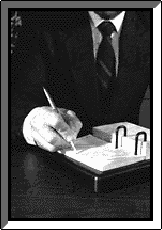|
|
77 INVESTIGATIONS, Inc.
Private Investigator License: 1376
Private Investigator Employment
Employment
Private investigators held about 61,000 jobs in 1998. About 1 out of 4 was self-employed. Approximately one third of salaried private investigators worked for detective agencies, while another third were employed as a store investigator in department or clothing and accessories stores. The remainder worked for hotels and other lodging places, legal services firms and in other industries. In contrast, lawyers held about 735,000 jobs in 2004. Approximately 3 out of 4 lawyers practiced privately, either as partners in law firms or in solo practices. Police and detectives held about 842,000 jobs in 2004. About 80 percent were employed by local governments. The truth is that many apply for private investigator work but few actually make it.
Private Investigator Training, Other Qualifications, and Advancement
There are no formal education requirements for most private investigator jobs, although many private investigators have college degrees. Almost every working private investigator builds on previous experience in other occupations. Some work initially for insurance or collections companies or in the private security industry. A private investigator can enter the field after serving in military, government intelligence, or law enforcement jobs.
Former law enforcement officers, military investigator, and government agents often become a private investigator as a second career because they are frequently able to retire after 20 years of service. Others enter from such diverse fields as finance, accounting, commercial credit, investigative reporting, insurance, and law. These individuals often can apply their prior work experience in a related investigative specialty. A few enter the occupation directly after graduation from college, generally with associate or bachelor of criminal justice or police science degrees.
The majority of states and the District of Colombia require a private investigator to be licensed by the state or local authorities. Licensing requirements vary widely. Some states have few requirements and 5 States including Alaska, Colorado, Idaho, Mississippi, and South Dakota have no statewide licensing requirement for a private investigator while others have stringent investigator regulations. For example, the California Department of Consumer Affairs, Bureau of Security and Investigative Services, requires a private investigator to be 18 years of age or older; have a combination of education in police science, criminal law, or justice, and experience equaling 3 years (6,000 hours) of investigative experience; pass an evaluation by the Department of Justice and a criminal history background check; and receive a qualifying score on a 2-hour written examination covering laws and regulations to be issued a private investigator license. There are additional requirements for a firearms permit. A growing number of states are enacting mandatory training programs for a private investigator. In most states, convicted felons can’t receive a license to be a private investigator.
For private investigator jobs, most employers look for individuals with ingenuity who are persistent and assertive. A candidate must not be afraid of confrontation, should communicate well, and should be able to think on his or her feet. Good interviewing and interrogation skills also are important and are usually acquired in earlier careers in law enforcement or other fields. Because the courts are often the ultimate judge of a properly conducted investigation, the private investigator must be able to present the facts in a manner a jury will believe.
Training in areas such as criminal justice are helpful to a private investigator. Most corporate investigators must have a bachelor’s degree, preferably in a business-related field. Some corporate investigators have master’s degrees in business administration or law, while others are certified public accountants. Corporate investigators hired by large companies may receive formal training from their employers on business practices, management structure, and various finance-related topics. The screening process for potential employees typically includes a background check of a candidate’s criminal history.
Some investigators receive certification from a professional organization to demonstrate competency in a field. For example, the National Association of Legal Investigators (NALI) confers the designation Certified Legal Investigator on licensed investigators who devote a majority of their practice to negligence or criminal defense investigations. To receive the designation, applicants must satisfy experience, educational, and continuing training requirements, and must pass written and oral exams administered by the NALI.
Most private investigator agencies are small, with little room for advancement. Usually there are no defined ranks or steps so advancement takes the form of increases in salary and assignment status. Many private investigators work for detective agencies at the beginning of their careers and after a few years start their own private investigator firms. Corporate and legal investigators may rise to supervisor or manager of the security or investigations department.
Source
A private investigator may also get involved in an investigation to find people, order a dna test, a background check, bodyguard assignments, locate deceased people, surveillance, find information and debt collection.
| 77 Investigations, Inc. Corporate Offices |
| 3200 West End Ave Suite 500 Nashville, TN 37203 Co Lic: 1376 |
410-9 Blanding Blvd #123 Orange Park, Florida 32073 Lic: A2400226 Jacksonville, Florida Region |
Free Call Nationwide (888) 259-4474












